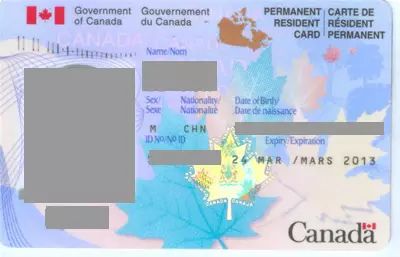The Canadian Immigration Department Launches A New Platform To Replace The Maple Leaf Card. Do You Know The Conditions And Advantages?
The Canadian Immigration Department Launches A New Platform To Replace The Maple Leaf Card. Do You Know The Conditions And Advantages?
The Canadian Immigration Department announced not long ago that it will launch a new electronic platform to facilitate people to apply for replacement of maple leaf cards. Unlike in the past, people need to upload professional digital photos when applying, and no longer need to mail documents. The Ministry of Immigration has not announced the specific date for the new platform to be released
The Canadian Immigration Agency recently announced that it will officially launch a brand new online service platform, aiming to simplify the procedures for the public to replace the maple leaf card. A highlight of this platform is that applicants need to submit high-quality digital photos without having to submit paper documents by mail. Although the Immigration Bureau has not disclosed the exact time when the platform is officially opened, it has made it clear that the platform will be put into use immediately after the system debugging is completed.
Conditions for Canadian immigration to replace maple leaf card?
People with permanent resident status have lived in Canada for at least two consecutive years for the past five years, and their maple leaf card is currently expired or is expected to face expiration within the next nine months.
They need to submit application documents in Canada. If you are abroad, you must first apply for a permanent resident travel license and apply for a new maple leaf card after returning to Canada. The relevant application fee is approximately 50 Canadian dollars.
If the application is successfully approved, the Immigration Bureau will send a new maple leaf card. Once permanent residents get the new card, they should destroy the old card, for example cut it in half.
Why do Canadian immigration have such an advantage?
Improve children's education
The Canadian government advocates that "the school at home is the best school."
After obtaining permanent resident status in Canada, individuals can enjoy free public education resources from primary school to high school, and children from low-income families can also receive government-issued child benefits. After entering university, tuition fees are significantly lower than those of international students, and there are many ways to apply for scholarships and grants. One of the key reasons why many immigrant families choose Canada is to ensure that their children do not lose at the starting line of their lives.
Eugenics Education
For some Chinese families, children are not only a source of sweetness that brings joy, but also a heavy financial burden. The cost of raising children is expensive and often brings financial pressure to families.
Canada has a vast territory, second only to other countries in the world, but its population is only tens of millions, making it sparsely populated. In view of this, Canada strongly advocates childbirth, from the time pregnant women are pregnant to the adulthood of their children, and mothers do not even need to go out to work, ensuring the living standards of the entire family.
Life is guaranteed for the elderly
Canada is famous worldwide for its outstanding quality of life environment and is known as the ideal place for elderly care worldwide. According to the World Health Organization, life expectancy for Canadian residents has reached 82.8 years.
Canada has a complete pension security system, which includes a complete universal medical insurance system and public medical services. In addition, the government has also provided a variety of welfare measures for the elderly, which jointly ensure the quality of life of the elderly and enable them to enjoy their old age with peace of mind.
Economic stability, many development opportunities
Canada is an industrialized country with a highly developed economy and advanced technology, ranking among the richest countries in the world. Under a stable economic situation, Canada has not only become one of the best business environments in the world, but also has broad business development prospects thanks to its geographical advantages bordering the United States.
Canada is in the world's leading position in manufacturing, resource product development, international trade and high-tech development, attracting many multinational companies to settle in, thus creating a large number of jobs.
Convenient living conditions
Canada has complete infrastructure and meticulous social services. Public medical institutions provide free services, and people do not need to pay any fees for medical treatment, and the elderly aged 65 and above are exempt from fees for even medicines; free education is implemented, and public kindergartens, primary schools and middle schools are exempt from tuition fees; public transportation systems are well developed, with many subways, buses, long-distance buses, trains, and aircraft routes, and all the routes are well connected; postal services are excellent traditions, and each residential area is equipped with an email address, and important letters are delivered directly to your home.
With generous benefits and excellent treatment, Canada's immigration policy is also very attractive! As a valuable heritage in traditional immigrant countries, Canada has set up a diverse immigration program in order to attract immigrants, providing applicants with rich immigration channels. Among them, investment immigration, self-employed immigration, employer-guaranteed immigration, etc. are the most common ones. Each method has its own unique advantages and can meet the personalized needs of different applicants.
Which way to immigrate to Canada is right for you?
1. Have a business background, shareholders or executives
With business experience, as a shareholder or a senior company executive, if you are interested in investing and conducting business in Canada, you can choose to start a business immigration method.
Entrepreneurs need to obtain a work visa and conduct business in the destination country before immigration. After successfully meeting the entrepreneurial conditions, they can apply for permanent residence; in Saskatchewan and Manitoba, entrepreneurs need to conduct entrepreneurial activities in their provinces, while entrepreneurial immigration applicants at the federal level have the right to choose the entrepreneurial province and apply for permanent residence qualifications in accordance with the regulations of the selected province.
2. Young and have a skill
If you are young and have a high education and good English, you can choose skilled immigration.
The cost of skilled immigration is relatively low and the expense is less, but it needs to be screened through the scoring system. Young people, those with IELTS scores between 5 and 8 points and those who are in short-term careers often have more readily approved applications.
3. Good at learning
If neither of the above options meets your needs, you can consider studying abroad or choosing to immigrate after studying abroad (it is recommended to complete it before the age of 40).
To choose to immigrate to Canada, you must first apply for higher education in the country, whether it is a junior college, undergraduate or master's degree. After completing your studies, students can use their province's immigration program, employer-guaranteed immigration, immigration based on work experience or master's and doctoral programs to apply for permanent residence.





